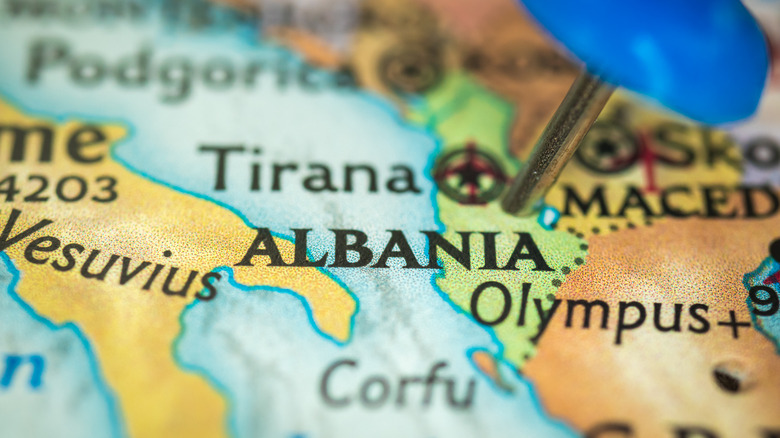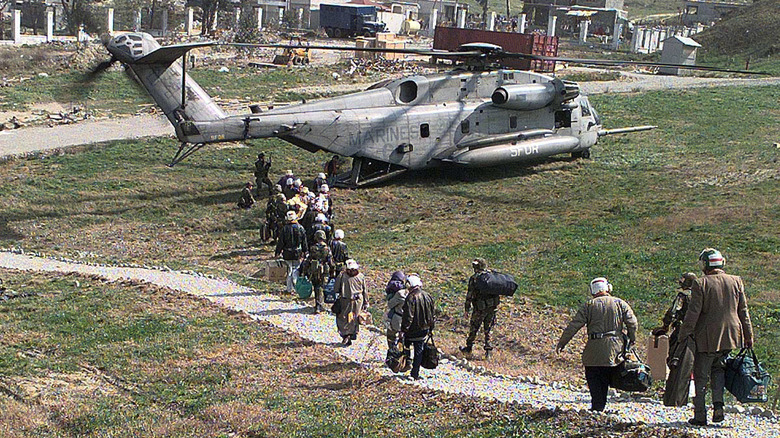How Pyramid Scheme Failures Led To Civil War In Albania
Over in southeastern Europe sits a little country that rarely comes up in the discussion of international politics. Albania (map above) is pretty small, both in terms of land area (roughly the size of the state of Massachusetts, according to World Population Review, and in population (2.8 million people, per Britannica, or roughly the same population as the state of Mississippi, per World Population Review).
For decades, Albania's fortunes were, like those of many other countries in the region, tied to the Soviet Union. As the academic paper "Albania and the Soviet Union: A Complicated Relationship ... A Short Review" (via Research Papers in Economics) reports, the communist country depended on the Soviets for education, technology, culture, and so on. However, that all changed with the collapse of the Soviet Union in the early 1990s. Suddenly, the country was on its own, and after decades of communism, was forced to transition to a free-market economy. Unfortunately for the people of Albania, they weren't fully versed on what works and what doesn't work in the free market, a situation that eventually led to Albanians losing over a billion dollars to a series of pyramid schemes, which itself led to a civil war that claimed over 2,000 lives, as the International Monetary Fund reports.
What's A Pyramid Scheme?
A pyramid scheme, as Investopedia describes it, is a form of investment in which the investors are paid not by the earnings of the thing they're investing in — such as a company — but by later investors. In some cases, they're not investing in anything at all, beyond an idea or a lie touted by the person behind it. Those later investors must themselves recruit investors, who will in turn recruit more investors, until the whole thing falls apart – leaving investors with empty pockets. It's unsustainable and, more to the point, it's illegal, and more than one shyster has gone to prison for carrying out a pyramid scheme.
In the Albanian case, keep in mind that the country's people had, for decades prior, been governed by the communist system, meaning that they weren't exactly wise to the more fraudulent aspects of capitalism. As an example, reported by Dissent Magazine, one woman named Drita sold her apartment for $25,000 and invested it in a pyramid scheme, as did untold tens of thousands of other Albanians.
By January 1997, the amount of money invested in Albanian pyramid schemes was in the neighborhood of $1.2 billion, or about half of the country's GDP at the time. When the system collapsed, Albanians, now broke from fraudulent promises that never materialized, took to the streets.
The Albanian Civil War
As 1996 closed and 1997 began, as Global Security reports, protests erupted in Albania as tens of thousands of defrauded Albanians took to the streets. Some blamed their government for their predicament, and eventually the protests descended into riots, and the country was plunged into anarchy. Meanwhile, rioters had managed to loot weapons — including about half a million rifles — from arms depots. Armed protestors began clashing with police, and across the country, government buildings were set on fire. Then soldiers began deserting, more weapons were looted, and much of the country was under the control of criminal gangs.
By March 1997, the United Nations had intervened, first by distributing humanitarian aid, and then by April had deployed troops to the country to help restore law and order. It worked. Within a few months they had done their job and, order having been restored, closed up the operation. According to the academic paper, "Out of Albania: the Albanian Civil War and the second Albanian 'Migration Crisis,'" the civil war had claimed about 2,000 lives, and had sent untold numbers of refugees elsewhere into Europe, including to Italy, which itself faced a refugee crisis during the war.


